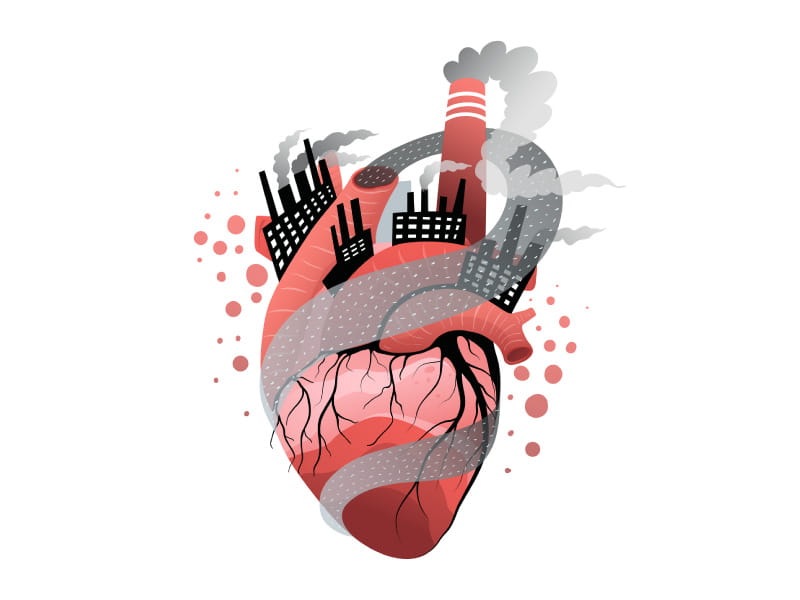Breathing polluted air may trigger skipped heartbeats in otherwise healthy teens
By American Heart Association News

Breathing polluted air may trigger irregular heart rhythms in otherwise healthy teens – even when pollution levels fall within standards set by the government, new research suggests.
The study found teens experienced skipped heartbeats within two hours of breathing fine particulate matter, the type of pollution that comes from car and truck exhaust or wildfires. The findings were published Wednesday in the Journal of the American Heart Association.
While prior research shows that breathing polluted air may cause harm to cardiovascular health in adults, researchers said this was the first study to investigate how air pollution may affect heart health in U.S. teenagers.
Though rare, irregular heart rhythms can lead to sudden cardiac death in otherwise healthy adolescents and young adults, lead author Fan He said in a news release. He is an instructor in public health sciences at the Penn State College of Medicine in Hershey, Pennsylvania.
"Our findings linking air pollution to irregular heart rhythms suggest that particulate matter may contribute to the risk of sudden cardiac death among youth," He said. "Since childhood and adolescent cardiovascular conditions can track into adulthood and affect risk of major cardiovascular disease later in life, identifying modifiable risk factors of cardiac arrhythmia that may cause sudden cardiac death among adolescents should be of great public interest."
Fine particulates are less than 2.5 microns in size, making them easy to inhale deep into the lungs. They also can enter the bloodstream. Once inhaled, they can irritate the lungs and blood vessels around the heart. Over time, they may contribute to cardiovascular disease.
The U.S. Environmental Protection Agency sets air quality standards at 35 micrograms of particulate matter per cubic feet of air per day. Average particulate matter concentrations in this study were approximately 17 micrograms per cubic foot, well below that standard.
Researchers measured exposure to fine particulate matter in the air breathed by 322 teens in central Pennsylvania for 24-hour periods between 2010 and 2013. At the same time, they measured electrocardiogram tracings for each teen's heart rhythms using wearable devices called Holter monitors. The teens in the study were an average 17 years old, free of major cardiovascular conditions and considered at low risk for irregular heart rhythms.
The researchers looked at two types of irregular heart rhythms characterized by a premature contraction of the heart muscle, also known as a skipped heartbeat.
Premature atrial contractions, or PACs, occur when the irregular heartbeat comes from the top chamber of the heart. Usually, this doesn't cause any harm. However, PACs have been associated with an increased risk for atrial fibrillation – a type of irregular heartbeat in which the top chambers of the heart quiver. This can lead to a higher risk for blood clots and strokes.
The other type is called a premature ventricular contraction, or PVC. These occur when the irregular heartbeat comes from the lower chambers of the heart. They can raise the risk for heart attacks, strokes, heart failure or sudden cardiac death.
When either of these irregular rhythms occur without symptoms, they are not treated. If they occur frequently, they can be treated with medication or an implantable device that makes the heart beat regularly.
In the analysis, 79% of participants had at least one irregular heart rhythm during the 24-hour study period. Within that group, 40% had PACs, 12% had PVCs and 48% had both. For each increase of 10 micrograms per cubic foot of air, there was a 5% increase in the number of PVCs within two hours of exposure. There was no association between the increase in particulate matter exposure and PACs.
"It is alarming that we were able to observe such a significant impact of air pollution on cardiac arrhythmias when the air quality remained well within the health-based standards established by the EPA," He said. "It may suggest that adolescents who live in highly polluted areas" are at even higher risk.
Among adults, previous research shows even higher increases in PVCs due to particulate matter exposure.
The authors said reducing the number of irregular heartbeats in adolescents could reduce their risk for developing heart disease as adults.
"Protective measures, such as wearing masks and avoiding vigorous physical activities (outdoors), may be warranted on days that particulate matter concentration is high, especially during early morning rush hours," He said.
If you have questions or comments about this American Heart Association News story, please email [email protected].







